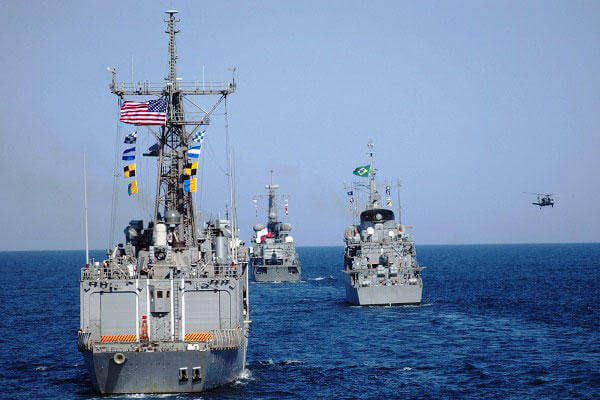President Obama and Defense Secretary Chuck Hagel hosted West African leaders last Friday to talk of the increasingly dangerous mix of pirates, drugs, and Al Qaida -- and the Navy's increasing inability to meet the threat in the region.
Marine Gen. John Kelly, head of the Southern Command, sounded the alarm ahead of the arrival in Washington of the three West African heads of state and a prime minister.
Kelly warned that his area of responsibility was already being short-changed in terms of the ships he can commit to anti-drug patrols, and the sequester budget cuts were only going to make his job harder and that of the drug cartels easier.
On top of his own warnings, Kelly echoed the January warning from Adm. Jonathan Greenert, the chief of Naval Operations: "The day could soon come when U.S. Southern Command has no assigned DOD surface assets to conduct detection and monitoring operations."
Kelly told the Senate and House Armed Services Committees that the result would be more drugs flooding the streets of the U.S. and also flowing to West Africa and then across the Sahara to Europe, with terror groups in the region skimming heavy profits to provide protection for the shipments.
Last year, Army Gen. Carter Ham, head of the Africa Command, described Al Qaida in the Islamic Maghreb, the group that has terrorized Algeria and Libya and that now controls swaths of northern Mali, as "al Qaida's best funded, wealthiest affiliate" through its drug trafficking and kidnaping for ransom rackets.
Kelly estimated that Southern Command ships seized 150-200 tons of cocaine worth about $3 billion to the cartels last year. "If I lose those assets, if they go to zero — and there are some that are predicting they will go to zero — then all of that cocaine, all of it, will get ashore, and more," he said.
But under the current sequester cuts, the frigates Rentz and Kauffman will not deploy to Southern Command this month, and the frigate Thach has been ordered to return to homeport about half-way through its six-month counter-narcotics cruise off the West Coast.
For years, the Drug Enforcement Administration has been giving the same warning about the drug cartel-al Qaida connection that Kelly gave to Congress last week.
"The last few years we've seen a huge amount of drug trafficking through West Africa," said Rusty Payne, a DEA spokesman. "They've come together for a marriage of convenience," Payne said of the Latin American traffickers and the African terror groups.
DEA Administrator Michele Leonhart has made it her top priority to "disrupt and dismantle the major drug trafficking supply organizations and their networks, including organizations that use drug trafficking proceeds to fund terror."
In the first narco-terrorism case ever brought against Al Qaida, Leonhart and Preet Bihara, the U.S. Attorney for the Southern District of New York, in 2009 charged three suspects arrested in Ghana with conspiracy and drug trafficking.
The three -- Oumar Issa, Harouna Toure and Idriss Abdelrahman -- allegedly were involved in schemes "to transport cocaine through West and North Africa with the intent to support three terrorist organizations ‑‑ Al Qaida, Al Qaida in the Islamic Magreb ("AQIM"), and the Fuerzas Armadas Revolucionarias de Colombia (Revolutionary Armed Forces of Colombia, or FARC)," the indictment said.
Leonhart said at the time that "the arrests are further proof of the direct link between dangerous terrorist organizations, including Al Qaida, and international drug trafficking that fuels their violent activities."
In addition to drug trafficking, the West and Central African states and the U.S. have also voiced growing concern about the surge in piracy in the oil-rich Gulf of Guinea and the connections to criminal gangs and terrorists.
Last month, more than 20 West and Central African states met in Benin and issued a statement on the threats posed by piracy, armed robbery and other illegal maritime activities in the waters of Central Africa and West Africa.
Africom's Gen. Ham has stressed that maritime partnerships and maritime security and safety are increasingly important in the Gulf of Guinea region to combat a variety of challenges including maritime crime, illicit trafficking and piracy.
But Ham has no naval assets in Africom, which put the focus on partnering in the meetings between Obama, Hagel, and the West African leaders.
The meetings last Thursday at the White House and the Pentagon with Sierra Leone's President Bai Koroma, Senegal's President Macky Sall, Malawi's President Joyce Banda and Cape Verde's Prime Minister Jose Maria Neves focused on shared priorities in countering terrorism, combating transnational threats, and enhancing maritime security according to a statement issued by Hagel later.
President Obama, who is mulling a visit to Africa later this year, said, "We've seen drug cartels that are using West Africa in particular as a transit point.
"And so the United States will continue to cooperate with each of these countries to try to find smart solutions so that they can build additional capacity and make sure that these cancers don't grow in their region."
But for now it appears that the African leaders won't be doing any partnering against the pirates with the U.S. Navy.





























